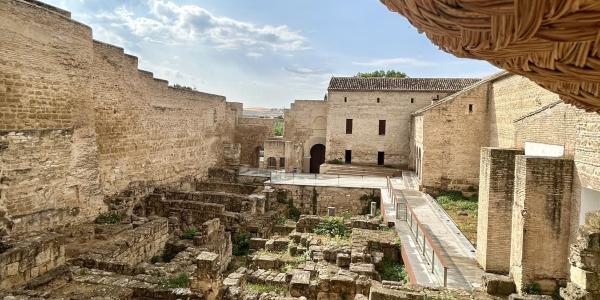WashU’s immersive Summer Language Institute helps students hone their language skills and step out of their comfort zones.

As an American college student, there are three things I know with certainty: the haunting last line of “The Great Gatsby,” the first 17 digits of pi, and my Starbucks order.
But as I walked into my green-and-white haven for the first time on a different continent, it dawned on me: My usual rapid-fire request for a grande decaf iced caramel latte with oat milk would no longer be rapid. I had to figure out how to say “lactose-free” in Spanish. Despite having studied the language for eight years, I became a stuttering, stuck record, only able to utter “no caliente” (“not hot”) when asked what kind of drink I’d like. “¿Entonces…frío?” (“so…cold?”), the bemused barista replied. I nodded. He chuckled, and my cheeks burned.
What felt like an eternity later, I had trudged through my order and, exasperated, offered a handful of crumpled euros to the cashier. Given that this was one of my first interactions while studying abroad in Madrid, Spain, one might guess that I subsequently went full-on turtle, retreating into a shell of silence. Instead, I got louder.
I knew that my experience in the Summer Language Institute in Spain would be immersive. Six weeks in Spain. Living with a host family. Classes, activities, and interactions all in Spanish. While this was a gulp-worthy notion, it was also electrifying. I also knew from experience that immersion in foreign language learning makes all the difference. In high school, my Spanish classes were largely conducted in English. As a result, when I entered my first college-level language course — this one entirely en español — I realized something: Despite six years of rote memorization and conjugation drills, I actually had no clue how to speak Spanish.
My first three years of language learning at WashU forced me to put the abstract grammatical lessons I’d learned into practice. I began to finally consider myself a proficient Spanish speaker. Wanting to magnify the impact of immersion, I enrolled in the Madrid summer program, eager for my surroundings to work their magic.
Magical, truly, is an apt description of my experience abroad. I saw historical epochs brought to life as my class traveled to the very cities — Toledo, Córdoba, Segovia — we’d studied. I witnessed course concepts — Franco’s dictatorship, Spanish women’s rights — transformed into the lived experiences of locals who spoke to our class. And I felt the power of connection as I bonded with classmates over crowded metro rides, a long weekend in Barcelona, and a few too many churros.

Much to my surprise, however, the immersive aspect of my travels was not what made them life changing. What made them impactful was my choice to trade my inner turtle for a howler monkey; instead of limiting myself to the baseline immersion of the program, I sought out opportunities for even more interactions.
After an eight-hour plane ride in May, I was exhausted and nervous to speak to my host mom, Gloria. Nevertheless, I took a deep breath and guided our initial conversation about the weather into an intense discussion about climate change and Spanish environmental movements. Although I didn’t always have the vocabulary to communicate what I intended, I didn’t stop trying. As a result, Gloria has become family to me. Over lunches, dinners, and spontaneous conversations, we connected over a shared love of theater and writing, comparing the political situations in our respective countries, and the occasional bout of gossip about our love lives.
I sampled traditional dishes (Paella! Patatas bravas! Octopus!) thanks to Gloria’s unparalleled cooking and the array of superior restaurants in the Spanish capital. I visited museums, marveling at “Las Meninas” at the Museo del Prado and an ornate mantelpiece at the Museo del Romanticismo. I stepped out of my comfort zone, opting for a solo trip to Seville even though I had never traveled alone and shedding my 80-year-old persona to stay out late dancing with friends. And whether I was sitting on trains or sipping on lattes, I pushed myself to make small talk — which inevitably grew into big talk — with the strangers next to me.
The person who came home from Madrid is not the same person who, just six weeks earlier, set foot on Spanish soil. My Spanish is undoubtedly stronger, as is my sense of self. I owe infinite gratitude to my professors, friends and classmates, host family, and the many Spanish locals with whom I interacted — including the barista who laughed at me — for enabling me to take my immersive experience to even greater heights.
Alexis Bentz is a senior double majoring in English and Spanish. Whether she’s serving as editor-in-chief of Spires Intercollegiate Arts & Literary Magazine, running the Creative Writing Cafe for WashU’s aspiring authors, or promoting childhood literacy with the community service group Out of the Blue, she’s constantly looking for ways to share her love of language with others.





